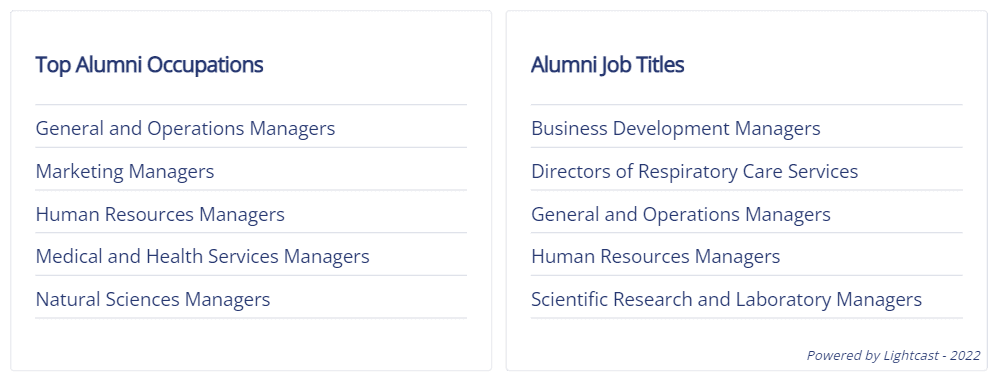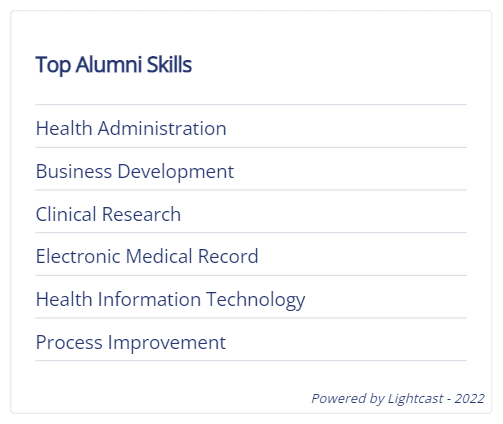Healthcare administration is an ideal career field for those interested in entering administrative support and administrative management roles of healthcare. Career opportunities for healthcare administration professionals can be found throughout the healthcare continuum, from forward-facing positions in inpatient services to behind-the-scenes roles in finance or human resources – healthcare administration provides a variety of career adventures from entry-level to senior leadership positions.
The University of Providence’s Bachelor of Science In Healthcare Administration prepares graduates to serve in supervisory roles throughout the healthcare continuum while learning in-demand skills designed to prepare graduates for various healthcare administration career opportunities. In addition, a BS In Healthcare Administration opens doors for continuing education opportunities; including graduate-level degree programs, professional and educational certifications, and workforce training and development.
A B.S. In Healthcare Administration Opens Career Opportunities
One of the primary benefits BS In Healthcare Administration students receive is access to various job positions and titles. As healthcare institutions across the country continue to grow both in the size of their workforce and the scope of their care, so is the demand for qualified healthcare administrators to facilitate operations, field public inquiry, mitigate patient services, market hospital advancements, and manage departments such as human resources and finance. With a BS In Healthcare Administration from UP, graduates are prepared to meet the various career opportunities.
Since careers within healthcare administration fall across a broad scope of practice, there are many career opportunities for graduates to pursue. Moreover, healthcare administrators are not relegated to just hospitals or clinics. Many of today’s healthcare administrators work in specialty care offices, rehabilitation and nursing care facilities, elder-care facilities, and smaller clinics or urgent care centers. These smaller locations need healthcare administrators just as much as the larger hospitals and health networks. New reporting from Lightcast paints a picture of projected growth within specific career fields under the healthcare administrators’ scope of practice. Find out more below:

B.S. in Healthcare Administration at the University of Providence
The University of Providence’s BS In Healthcare Administration program prepares students to serve in various roles throughout the healthcare field. Our dynamic curriculum is designed to integrate the foundations of general education with theory and practice in healthcare administration that prepares graduates to enter into a management position upon graduation.

Lightcast reports show that UP graduates find placement in various occupations across various job titles. Since UPs BS In Healthcare Administration program combines the foundations of general education with in-demand skills, our students graduate as well-rounded lifelong learners ready to pursue their goals and impart their knowledge wherever they end up. UPs BS In Healthcare Administration program doesn’t just teach basic skills – students are exposed to practical industry knowledge they can apply on day one of their position. Students are familiar with healthcare operations and practice, foundations, and fundamentals of leadership and relationship management, ethical judgment, and communication. These skills are highly valuable and transferrable throughout a healthcare administrator’s practice.

Explore all of UP’s Healthcare Administration program offerings.
Lightcast reports show that UP graduates find placement in various occupations across various job titles. Since UPs BS In Healthcare Administration program combines the foundations of general education with in-demand skills, our students graduate as well-rounded lifelong learners ready to pursue their goals and impart their knowledge wherever they end up. UPs BS In Healthcare Administration program doesn’t just teach basic skills – students are exposed to practical industry knowledge they can apply on day one of their position. Students are familiar with healthcare operations and practice, foundations, and fundamentals of leadership and relationship management, ethical judgment, and communication. These skills are highly valuable and transferrable throughout a healthcare administrator’s practice.
Associate of Science in Healthcare Administration
UPs two-year Associate of Science in Healthcare Administration program prepares students for entry-level roles in healthcare administration and management. The AS In Healthcare Administration program offers aspiring healthcare administrators with a foundational understanding of healthcare administration to prepare them for various roles in healthcare.
Bachelor of Science in Healthcare Administration
UPs Bachelor of Science In Healthcare Administration prepares graduates for managerial and supervisory positions in healthcare administration. The BS In Healthcare Administration program offers current or aspiring healthcare professionals with a foundational understanding of healthcare leadership which can be applied across small or large healthcare institutions.
Masters of Healthcare Administration
UPs Masters of Healthcare Administration, prepares graduates for senior leadership positions in healthcare administration and management. The MHA program offers graduates the opportunity to establish leading skills in applying transformational leadership practices to healthcare systems. Students who enroll in the MHA program will also have the opportunity to choose from three available concentrations in health justice, community health investment, or leadership.
In addition to UPs healthcare administration programs, certificate programs can be applied to help advance current healthcare administrators’ skill sets or provide the groundwork to transition into specializations within healthcare administration. UPs Applied Health Informatics Certificates dive into healthcare data and health records management, showing healthcare administrators how to utilize data to drive better patient care and paint a broader picture of patient care and service performance.
Our Post-Bachelor Certificate in Health Justice focuses on merging healthcare and legal services to form a new partnership centered around solving medical problems with a legal cause. Additionally, our Post-Bachelor Certificate in Community Health Investment explores health equity and the social drivers of health to develop a broad understanding of community health and identify collaborative opportunities for healthcare providers and community-based partners. Graduates of UPs MHA programs can apply credits earned from concentration programs toward earning a certificate in these programs.’
